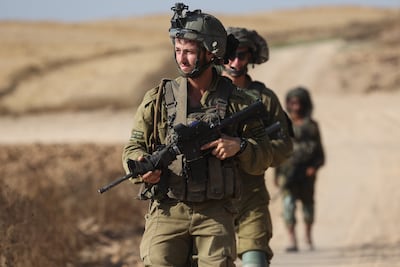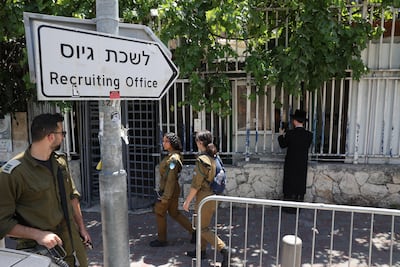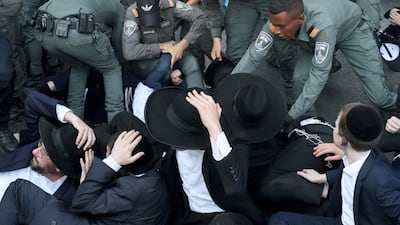Live updates: Follow the latest news on Israel-Gaza
Israel's highest court ruled unanimously on Tuesday that the state must begin drafting ultra-Orthodox men for military service, in a decision that risks leading to the collapse of Prime Minister Benjamin Netanyahu's governing coalition as Israel continues its war in Gaza.
The High Court of Justice said that, in the absence of a law that distinguishes between Jewish seminary students and other draftees, Israel’s compulsory military service system applies to ultra-Orthodox Jews – also known as Haredi Jews – like any other citizens.
Under long-standing arrangements, ultra-Orthodox men have been exempt from the draft, which is compulsory for most Jewish men and women. These exemptions have long been a source of anger among the secular public, a divide that has widened during the Israel-Gaza war.
Mr Netanyahu's fragile collation government is propped up by powerful ultra-Orthodox parties – including Shas and United Torah Judaism – which oppose the change. If the exemptions are ended, they could leave the coalition and cause the government to collapse, leading to new elections.
On the other hand, the Israeli military and much of secular Israeli society has long supported the conscription of ultra-Orthodox, who some see as having unfair exemptions.
Opposition leader Yair Lapid called on the Defence Ministry “to uphold the law and issue tens of thousands of draft orders for young Haredi men who evaded military service until now”.

Israelis are bound by law to serve in the military from the age of 18, for three years for men and two years for women. Members of Israel's 21 per cent Arab minority are exempt, though some do serve, and ultra-Orthodox Jewish seminary students have also been largely exempt for decades.
The law covering the exemption for seminary students expired last year, but the government continued to allow them not to serve. The court ruled that in the absence of a new legal basis for the exemption, the state must draft ultra-Orthodox Jewish seminary students.
To add further pressure on the ultra-Orthodox coalition parties, the ruling also barred seminaries from receiving state subsidies if scholars avoid service without deferrals or exemptions.
With a new law on the issue now being discussed in parliament, Education Minister Yoav Kisch, of Mr Netanyahu's Likud Party, voiced hope that agreement could be reached on a compromise.
“Not in a civil war, not in a fight that will tear apart Israeli society in the middle of a tough war. It's possible to do it together,” Mr Kisch said.
The Likud party said the solution to the draft issue was a bill revived earlier this month that would set benchmarks for increasing ultra-Orthodox enlistment. Some in the party, including Defence Minister Yoav Gallant, have signalled their unease at the exemptions.
Ultra-Orthodox leaders regard exemptions as necessary to preserve their religious and cultural traditions.
“There's no judge there who understands the value of Torah study and its contribution to the people of Israel throughout the generations,” said ultra-Orthodox MP Moshe Gafni.
Ultra-Orthodox politician Yitzhak Goldknopf, the leader of the United Torah Judaism party and Housing Minister in Mr Netanyahu's cabinet, condemned “an expected but very unfortunate and disappointing decision”.
Demonstrations against Tuesday’s ruling are expected in Jerusalem.
“We expect to see demonstrations and blocked roads in Israel from the more extreme Orthodox and we might be in a political crisis that will threaten the stability of the government,” said Shuki Friedman, vice president of the Jewish People Policy Institute think tank.

The Israeli military has previously signalled it supports conscription from the ultra-Orthodox community. This month, chief of staff Herzi Halevi said there was a “definite need” for ultra-Orthodox battalions to be established.
“Each such regular Haredi battalion that we establish removes our need to draft many thousands of reserve soldiers,” he said at the launch of a voluntary battalion of ultra-Orthodox Jews.
The ultra-Orthodox conscription waiver has become especially controversial as Israel's armed forces – comprised mostly of teenage conscripts and older civilians mobilised for reserve duty – are overstretched by the war in Gaza and attacks across its northern border by Lebanese armed group Hezbollah.
“At the height of a difficult war, the burden of inequality is more than ever acute,” the court's ruling said.
Ultra-Orthodox Jews make up around 13 per cent of Israel's nearly 10 million citizens, according to the country's statistics bureau.
More than 37,650 Palestinians have been killed in Israel's assault on Gaza, which has destroyed much of the enclave's infrastructure and displaced most of the population.
This came after Hamas-led militants attacked southern Israeli communities on October 7, killing about 1,200 people and abducting 240.
Recent efforts to mediate a ceasefire between Israel and Hamas have failed.

